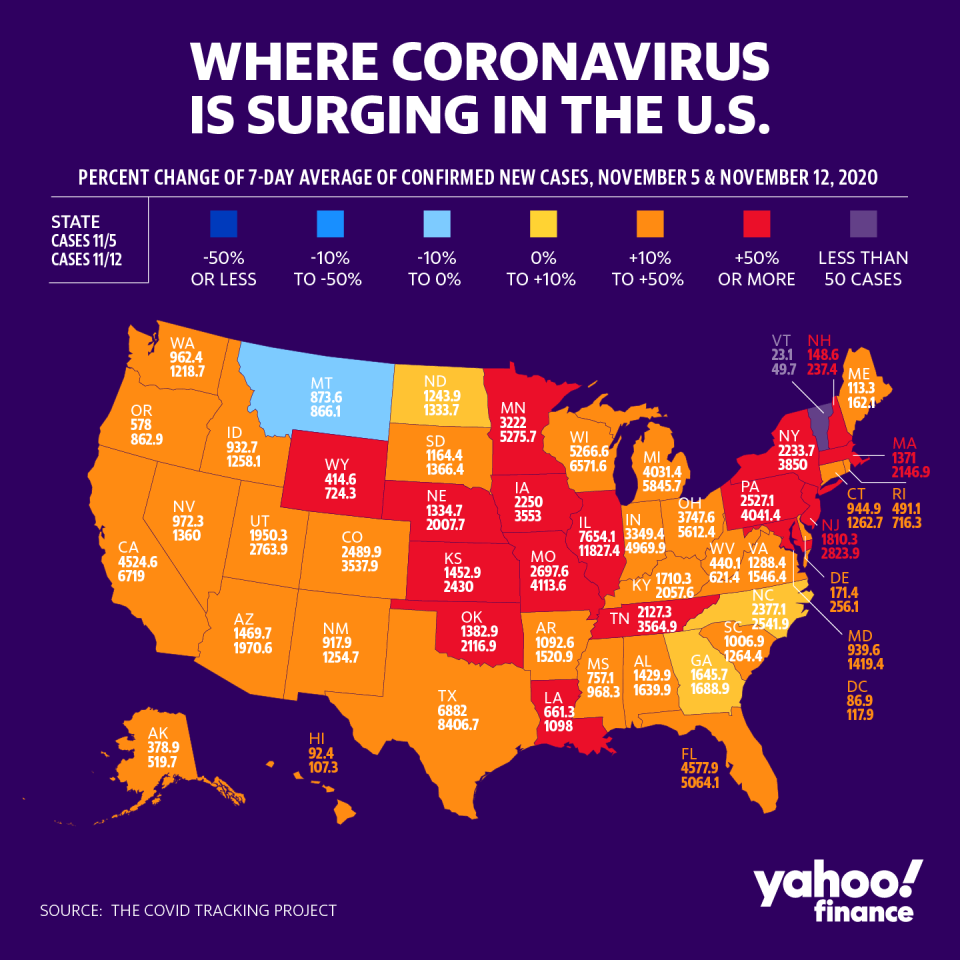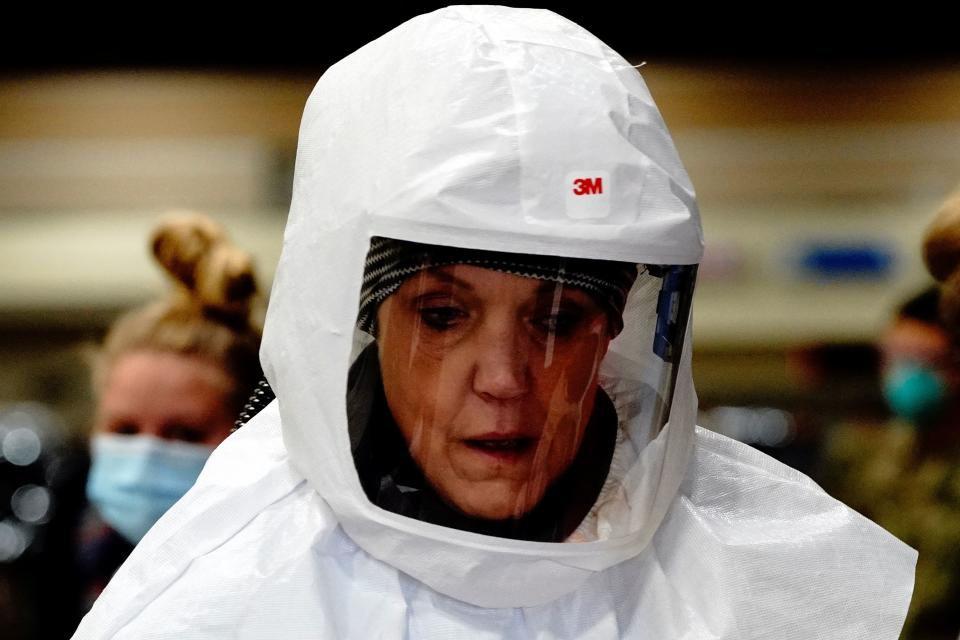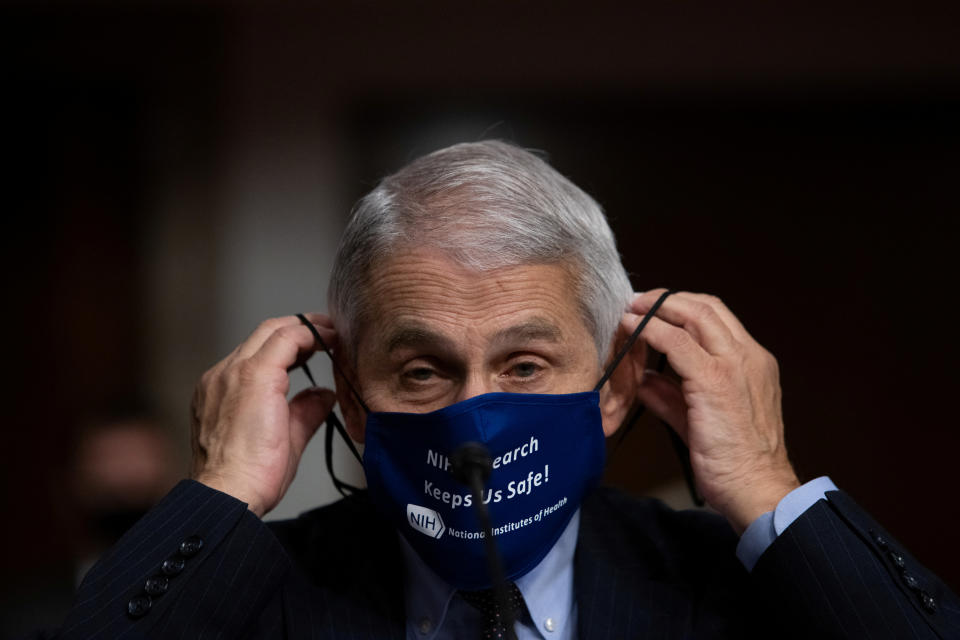Biden task force member: 'We are entering this period that I call COVID hell'
- Oops!Something went wrong.Please try again later.
There are more than 10.5 million confirmed coronavirus cases in the U.S. and at least 244,000 deaths.
Unfortunately, the pandemic is likely going to get worse, according to Dr. Michael Osterholm, director of The Center for Infectious Disease Research and Policy at the University of Minnesota and a newly-appointed member of President-elect Joe Biden’s coronavirus task force.
“We are entering this period that I call COVID hell,” Dr. Osterholm said on Yahoo Finance Live (video above). “Back on Labor Day, we were at about 23,000 cases of new coronavirus infection every day. Today, we’re going to be in the 130,000 to 140,000 [range] again. And that number is going to keep rising rapidly.”
The U.S. hit 170,000 new confirmed coronavirus cases on November 13, according to the COVID Tracking Project. There were roughly 27,000 new confirmed cases on Labor Day, September 7.
Dr. Osterholm identified two two major factors contributing to the latest surge in transmission: pandemic fatigue and overall skepticism towards the seriousness of the virus.
“People [are] just being tired of trying to avoid the public and places that put you at increased risk, pandemic anger,” he said, adding that there are still Americans who don’t believe the pandemic is even real: “So why adhere to any kind of public health recommendations?”
The recent spikes in cases are partly attributed to more people becoming lax about social distancing guidelines and face mask wearing while increasingly gathering indoors as the weather turns colder.
Furthermore, given the lack of a nationally-coordinated pandemic response to the coronavirus, some states have been responsible for developing testing strategies and finding PPE on their own. New York City is poised to have a 90-day stockpile of PPE and ventilators, while other states like California have worked on their own to secure similar options.

‘El Paso isn’t an isolated event’
The U.S. is on track to surpass 500,000 deaths by February 2021. Dr. Osterholm is hoping that once Biden takes office in January, his administration will be able to quickly set the U.S. on the right path.
“First of all, be prepared to hit the ground running on January 20,” Dr. Osterholm said. “And number two, in the meantime, even though we’re not in control of the government… we can pull together and share with the states and cities out there that have often been left to their own devices in terms of trying to respond to this pandemic so that in fact, that kind of information and support can be there.”
Death rates are accelerating, reaching more than 1,000 per day nationally. In Texas, where cases topped 1 million this week, the city of El Paso has resorted to mobile morgues and are already running out of space.
“People don’t want to hear that El Paso isn’t an isolated event,” Dr. Osterholm said. “El Paso, in many instances, will become the norm. We have health care systems right now that are overwhelmed already. And we’re talking about potentially doubling the number of cases over this time period before the President-elect even takes office.”

‘There won’t be blue or red counties. It will be COVID color.’
Dr. Osterholm said that the new administration would be placing trust in public health officials and experts, such as Dr. Anthony Fauci, the director of the National Institute of Allergy and Infectious Disease (NIAID) who has repeatedly drawn the ire of President Trump for vocalizing his concerns about the direction the country is headed towards in this pandemic.
“As a member of the task force, I know that the leadership of the task force, as well as the staff and the transition team, are working on that issue,” Osterholm said. “From listening to people like Tony Fauci and others, we’ve had a fair amount of information exchanged that already has occurred over the recent months. And that’s continuing.”

The Biden-Harris transition recently published its “plan to beat COVID-19.” Osterholm said the public will be hearing “much more in the very, very near term” of what the team is working on.
“We have to have a story to tell America,” Osterholm said. “We have to be able to explain to them what’s happening. This is the virus versus us. This is not the virus versus one group of politicians versus another, one regional area against another, hospitals versus what goes on in the community. This is us versus the virus.”
Adriana Belmonte is a reporter and editor covering politics and health care policy for Yahoo Finance. You can follow her on Twitter @adrianambells.
READ MORE:
Coronavirus vaccine 'doesn't help us today' as America sees deadly transmission surge
Coronavirus: ‘These attacks on experts are going to haunt us,’ doctor says
Coronavirus: ‘The pandemic is clearly out of control’ and America needs to mask up, doctor warns
Read the latest financial and business news from Yahoo Finance
Follow Yahoo Finance on Twitter, Facebook, Instagram, Flipboard, LinkedIn, YouTube, and reddit.


